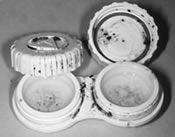Does your contact lens case look like this? Or someone you know for that matter. If it does you need to discard it or submerge it in boiling water to disinfect it. Better yet, you should just go get a new one at College Optical Express at UNT. Stop by and ask for a Contact Lens Solution Sample Kit.
Here are some simple steps to help avoid a dirty storage case:
- Discard used solution immediately after removing your lenses from the case each day.
- Rinse your lens case thoroughly, including the underside of the lids, with disinfecting solution.
- Air dry your case with the lids open.
- Replace your lens case at least 12 times a year or submerge it in boiling water to disinfect the case.
- Close the contact lens cases when not used to prevent dirt and other residue from entering
Dirty Cases:
The problem doesn’t usually begin with having a dirty storage case for your contact lenses. The problems tend to occur during the cleaning and disinfecting stage, developing into more serious problems inside the case.
It’s very important when cleaning your lenses with a multipurpose solution, to rub them, and then rinse them before placing them into the storage case. Rubbing your lenses removes the microorganisms, reducing the possibility that these same organisms will be transferred to the storage case or your eye.
What Can Grow in Dirty Cases:
If you do not practice proper cleaning, disinfecting and storing habits, one or all of these conditions can result in serious forms. Acanthamoeba, Fusarium and Keratitis are three major infections that can cause corneal transplants and even blindness if not treated early. Below are brief descriptions of them, including symptoms and treatment options.
Acanthamoeba is a microorganism commonly found in water, soil, sewage systems, HVAC systems and more. Acanthamoeba keratitis, also known as AK is a rare but serious infection in the cornea. It can develop in people who don’t properly clean or disinfect their lenses, people who use tap water or homemade solutions for cleaning and rinsing their lenses and people who swim, use the hot tub, or take showers while wearing their lenses. Symptoms can include eye pain, eye redness, blurry vision, sensitivity to light, excessive tearing or sensation of something in the eye. AK can result in the need of a corneal transplant, permanent visual impairments or even blindness.
Fusarium has occurred in a very low number of people to date, mainly in southern Florida and among people who use soft contact lenses. It’s a common fungus that lives on plants in warm climates, but has recently been tied to people using specific contact lens solutions. It’s a very serious disease that has caught the eye of the folks in the CDC and could result in the need of a corneal transplant. It’s been linked to the products Bausch & Lomb lens cleaner and ReNu MoistureLoc solution, both of which have been taken off the market.
Keratitis, or also known as corneal ulcers occur after corneal trauma with a foreign body like contact lenses. It allows bacteria or fungi to enter the cornea and causes deep infections, inflammation, severe pain, redness, and discharge. It can be treated with anti-bacterial or anti-fungal eye drops. In severe cases antibiotic treatment can eliminate the infection, but if not treated early enough it could result in the need of a corneal transplant.
Recalls You Should Know About
There are many products on the market today that are great for keeping your storage cases and your eyes safe and healthy. Take a look at the list below to make sure you don’t have any of these products under your bathroom sink or in your medicine cabinet. These products have all been recalled and are currently not on the market, however many products share parts or have similar names to products that are on store shelves.
- AMO’s Complete MoisturePlusTM Contact Lens Solutions
- Bausch & Lomb’s ReNU MoistureLoc Solution
- AMO’s Complete MoisturePlus Multipurpose Solution
- Bausch & Lomb’s ReNu MultiPlus Lens Care Solution (recalled twice)
Courtesy of www.eyecaresource.com and additional inputs from Dr. Tran of COE UNT


